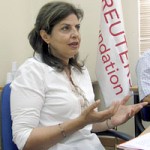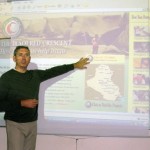
Magda Abu-Fadil trains future investigative journalists
An investigative journalism workshop aimed at promoting a culture of accountability and media’s watchdog role grouped young reporters from Lebanon, Saudi Arabia, Iraq and Jordan who kicked off a series of training courses at AUB.
Sanaa Diab of Lebanon’s “Al Balad” daily said: “This workshop demonstrated what real professional journalism means.”
The July 23-27, 2007 course organized by AUB’s Journalism Training Program (JTP) and funded by the Dutch Embassy in Lebanon introduced junior reporters to definitions of the genre, duties and responsibilities of investigative journalists, obstacles and legal limits to this type of reporting, ethics, ideas for reports and how to dig for information.

Elections coverage trainer Sanaa El Jack
“The workshop was a launching pad and opening to a wide and interesting area…I enjoyed delving into investigative reports and realize how much I’ve missed so far in my career,” said Mirna Seif of Lebanon’s “LBC” TV.
The reporters hailed from Lebanese dailies “Assafir” and “Al Balad,” pan-Arab dailies “Asharq Al-Awsat” and “Al Hayat,” the UAE’s “Al Imarat al Youm,” Lebanese “Al Shiraa” weekly, Lebanese monthly “Le Commerce du Levant,” “Laha” magazine, Lebanon’s “LBCI TV,” Iraq’s “Al-Soumariya TV” and “Elaph” website.
The second workshop August 27-30 focused on elections coverage, grouping reporters from Saudi Arabia, Yemen, Oman, Lebanon and Iraq representing “LBCI TV,” “Al Soumariya TV,” Bahrain’s “Al Waqt” newspaper, Lebanon’s “Assafir” daily, Iraq’s “Al Taakhi” daily, Iraq’s “Al Iraqiya TV,” Lebanon’s “National News Agency,” and Saudi Arabia’s “Al Madina” daily.
Anwar Al Hamadani of “Al Soumariya” TV said: “The workshop was important for Arab, and particularly Iraqi, journalists.”
The third course September 18-20 was aimed at war coverage/safety for journalists and featured former CNN chief news executive and president of newsgathering Eason Jordan.

Former CNN news chief Eason Jordan on war coverage, safety for journalists
The training involved basic rules about dangerous assignments, recognizing danger and weapons, health and safety precautions, accidents, first aid tips and medical aid, bodyguards, escorts, translators and fixers, safety equipment and gear and dealing with civil unrest.
Trainees also learned about the risks involved in embedding with regular and irregular combat troops, coverage of children and families in conflicts, media ethics in war situations and the role of humanitarian organizations and NGOs in wars.
The first-ever such workshop in Lebanon grouped reporters from Lebanon, Iraq, and Saudi Arabia representing “Al Jazeera.net,” of Qatar, Lebanon’s “National News Agency,” Lebanese dailies “An-Nahar,” “Assafir,” “Al Balad,” and “L’Orient-Le Jour,” pan-Arab dailies “Asharq Al-Awsat,” and “Al Hayat,” “Al Arabiya.net,” Iraq’s “Al Soumariya TV,” Iraqi daily “Al Taakhi,” and U.S. Government-funded “Al Hurra TV” and “Radio Sawa.”
The fourth workshop, on newsroom management, targeted mid-to-upper-level decision makers in print, broadcast and online media with participants from Lebanon, Morocco, Sudan, Iraq and Saudi Arabia representing Lebanon’s “LBCI TV,” “Future TV” and “Tele-Liban,” U.S.-funded “Al Hurra TV,” “Dubai TV,” Lebanese website “Now Lebanon,” Iraq’s “Al Soumariya TV,” as well as “Assafir,” “Al Taakhi,” “Asharq Al-Awsat,” “Middle East Reporter,” “IREX,” Sudan’s “Al Ahdath daily,” “Greenpeace” and AUB’s Information and Public Relations Office.
Keen reporters from Lebanon, Iraq and Palestine added to the (JTP) earlier momentum during a workshop on how to cover the environment and health matters.
The five-day mini-course featured AUB’s Faculty of Health Sciences Professor Iman Nuwayhid who engaged participants in definitions of environmental health and involved them in practical exercises.
“The workshop provided us with a clear picture about pressing environmental issues,” said “Assafir” reporter Khaldoun Zeineddine.
Ministry of the Environment Director General Berj Hatjian tackled the government’s perspective and legislative concerns, while managing editor Raghida Haddad of “Al Bia’ wal Tanmia” (Environment and Development) magazine focused on methods of reporting environmental and health topics, using case studies from her publication.
“This workshop added new information that’s essential to every journalist’s work,” said Rania Nader of “Sada Al Balad” newspaper.
Health in complex emergencies was the topic of a presentation by Dr. Muna Khalidi during the November 26-30 workshop. Her presentation was validated in footage of environmental field coverage by veteran “LBCI TV” senior correspondent Tania Mehanna, notably during Israel’s July 2006 war on Lebanon.
Driving the point further was Ghalia Fayad, from her perspective as an activist for the NGO “Greenpeace”, who spoke on advocacy for the environment and how her organization attracts media attention regionally and worldwide.
“This was a new experience for me and equipped me with invaluable information on environmental problems,” commented Zahida Bader of “Palestine TV.”
Dr. Najib Nimah, a public health physician and expert, went through a detailed presentation and discussion of safety for journalists in times of complex emergencies and environmental disasters. His background in the field was added value to the workshop.
Not to be overlooked was the issue of media ethics in coverage of the environment, disasters and emergencies, emphasized in a session by JTP director Magda Abu-Fadil.
Adding depth to the workshop’s content was a documentary film produced by the “World Conservation Union” on the oil spill in Lebanon caused by the July 2006 war. “Union” representative Hala Kilani discussed production of the film and its impact in raising awareness about the disaster’s consequences.
Videos on global warming, protection of the earth’s ozone layer, conservation, desertification and reforestation, and, endangered species added dynamism to the course, as did writing exercises for the journalists from Lebanon’s “An-Nahar,” “Assafir,” “Sada Al Balad,” “Al Akhbar” newspapers, “Al Hayat-LBC TV,” “United Press International,” “Asharq Al-Awsat” daily, “Al Mirbad” radio in Iraq and “Palestine TV.”
Another hot topic drew print, broadcast and new media reporters from Lebanon, Saudi Arabia and Iraq to a five-day workshop on citizen/online journalism. Web and new media experts Jessica Dheere and Karina Rodriguez guided participants who took to blogging and cyber publishing like fish to water.
“I’d like to request supplementary workshops to follow up on the subject,” said Iraqi journalist/trainer Ubaidallah Hirory, adding that participants should create a database for further exchanges of information and experiences in cyberspace.
Participants represented “Al Hayat-LBC TV,” “Al Mustaqbal” daily, “Menassat” website, “Greenpeace” website, “Al Nour” radio, “The Middle East Reporter,” “Sada Al Balad” daily, “IREX Iraq,” Iraqi newspaper “Al Riyadh Al Jadid” and “Al Mirbad” radio and TV in Iraq.
They created a class blog – short for web log – as well as individual blogs on which they posted daily content produced during the workshop.
“We need an advanced level (workshop) in online journalism,” said reporter and fledgling blogger Norma Khansa who reveled in the ability to create and produce her own online content.
The training December 3-7 involved writing, photo, audio and video editing and production, linking to other sites, online ethics, podcasting, RSS feeds, packaging stories for multimedia and different platforms, and presentations of the final products.
Hadi Abdel Ghaffar of “Al Nour” radio said each of the workshop session topics merited a separate and specialized course. He also urged organizers to provide faster and more accessible Internet service to maximize journalists’ efforts.
The environment and online journalism workshops were the fifth and sixth in a series sponsored by the Dutch Embassy in Lebanon.



